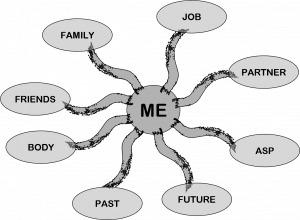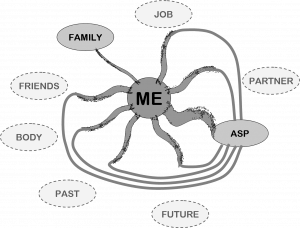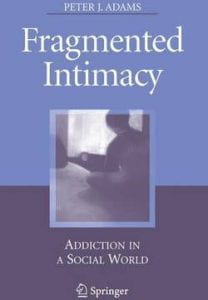Addiction is often seen as some form of attribute or condition belonging to an individual person and produced by a complex interaction of that person’s body and mind.
I see it differently. I see addiction as primarily a social event, and, through the metaphor of an octopus, the following will attempt to explain why.
First off, personal identity needs to be seen in terms of a complex set of connections. I connect with other people, with other things, with imaginary objects, with things in the past as well as with things in the future. These all define who I am.
For most of us, our relationships form into clusters of connections, such as family and work activities, and these then surround us and provide stability in our lives. This normal system of connecting resembles an octopus whose tentacles are linked to objects as depicted in this diagram:

Occasionally in winter I make a point of visiting the ocean shoreline. I am particularly fond of walking around the rocks at the end of a beach where he can stare down into the turbulent waters buffeting the rocks below where I imagine octopuses are moving around in the seaweed, spreading their tentacles and picking up bits to eat.
I know very little about the habits of octopuses, but I wonder what it must be like for them during a major storm. Waves would crash onto the shoreline, picking up any unattached objects and crushing them mercilessly.
So, to avoid damage, an octopus would need to cling onto as much as possible to avoid being dashed against the rocks. Each tentacle would need to a something stable and hold firm. This contrasts with calm times, when it is possible to move around without much need for attachments.
This works similarly for me. When things are going fine, I move about with scant regard for the wealth of connecting points that surround me. When things get rough – when I’m down, feeling rejected, suffering a major disappointment – I suddenly find myself valuing my connections to family, friends and work. I call on them in a variety of ways to help me through those hard times.
And in amongst the clusters of connections is one object labelled here as “ASP” and referring to addictive substance/process, such as alcohol, cannabis or gambling. ASPs are part of most of our lives because, even if we don’t consume them ourselves, loved ones around us do.
Now, in the normal course of life, one of these clusters of connections might be jostled and disrupted by events, such as a bereavement or unemployment, and we draw on the strength of other connections to manage the disruption. For instance, following a friend’s death I might find it comforting to spend more time at work.
But, equally, ASPs can be a convenient source of strength. For example, alcohol can play a variety of roles that include calming my nerves, filling in time and distracting me from negative thoughts. Alcohol is also very reliable; I know after a few drinks I will be feeling better, which is not always guaranteed with talking to friends.
Over time, an ASP can end up playing more and more of a role in the way I handle life’s hurdles. Perhaps my marriage falls apart and I’m drinking more, which then affects my work, leading to unemployment and more drinking. Slowly my long-term friends distance themselves and are replaced by booze mates. By now I have little interest in the past or the future, and only one family member, out of duty, stays connected, as depicted below.

This is addiction at a late stage. For many with addiction the connecting points have not entirely disappeared; but they will, typically, be in the process of deteriorating. And people around me notice and keep telling me everything will come right if I stop drinking.
But, imagine what that means. Imagine an octopus clinging onto only one rock and being asked to let it go. If it did, it would need to cling back onto that rock as soon as the weather gets rough.
The process of disentangling from an addictive way of connecting inevitably takes many years. It might first involve finding some other rock to replace the ASP, such as family, a fellowship or counselling. Then the task involves a slow restoration of the other rocks, those other connections, perhaps starting small with hobbies and health, then moving towards the bigger connections of employment and true friendships.
For much more detail on these processes see my book: Fragmented Intimacy: Addiction in a Social World
Also see my article: Switching to a social approach to addiction
We set the Kina Families and Addiction Trust up as a means of promoting a relational approaches to addiction: Kina website
Text & photo by Peter J. Adams

Recent Comments